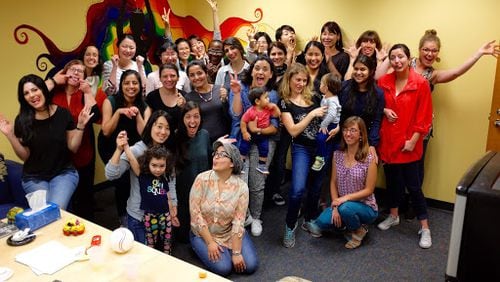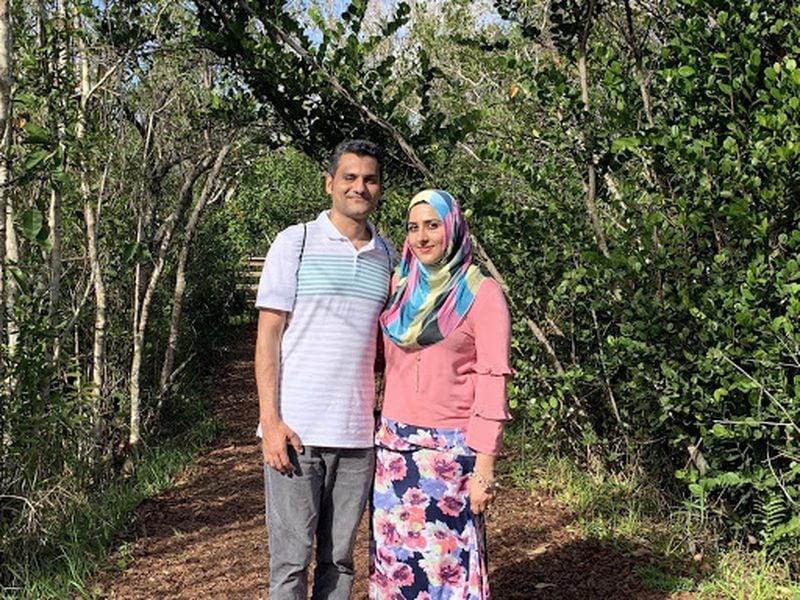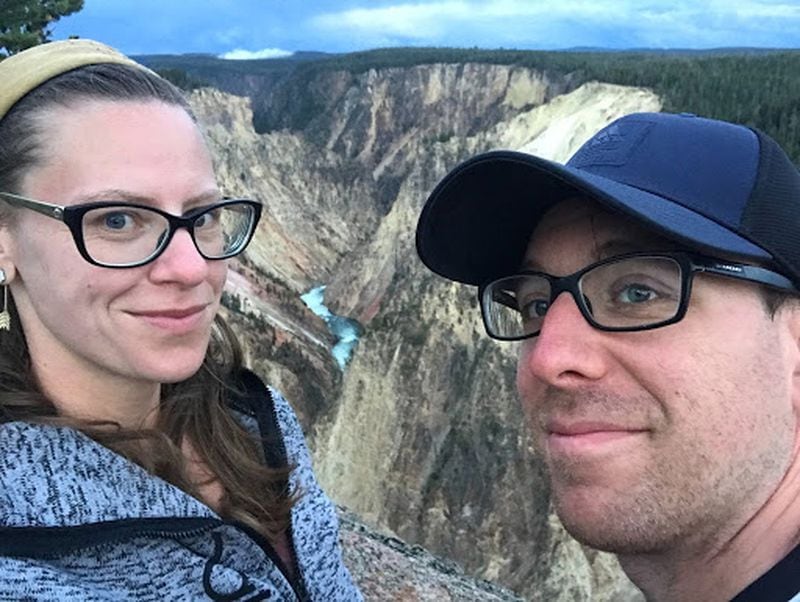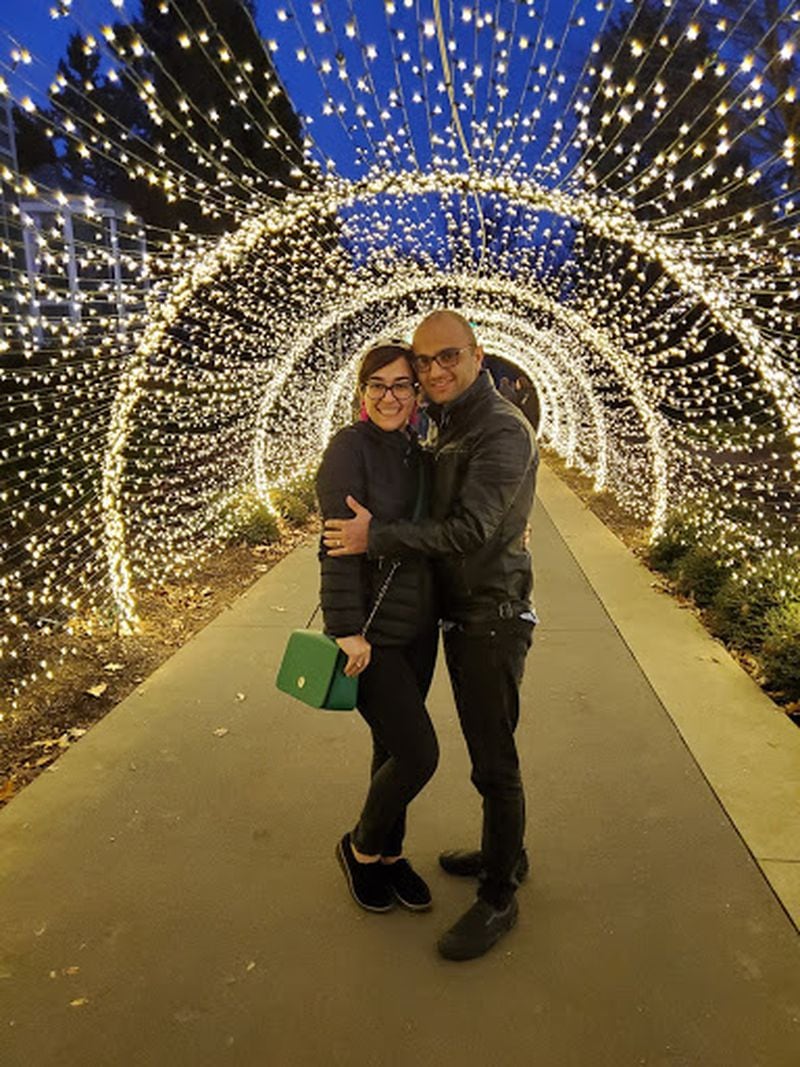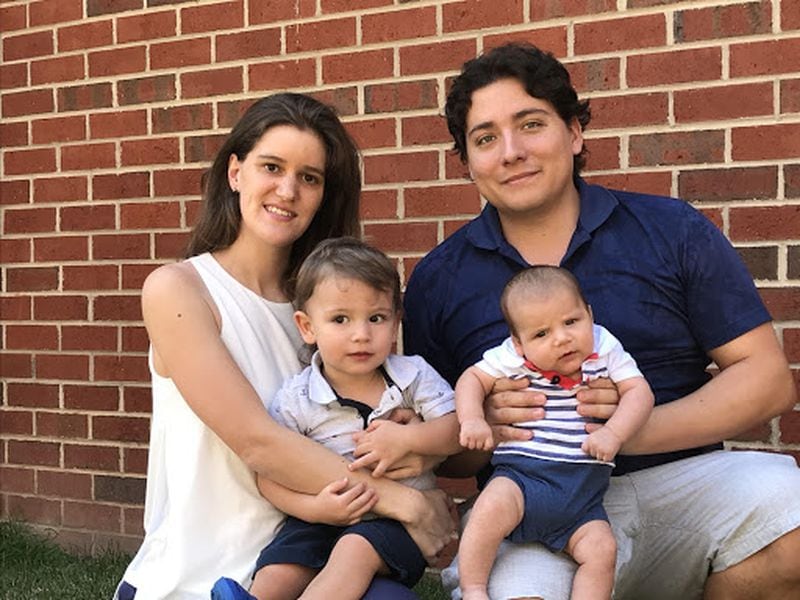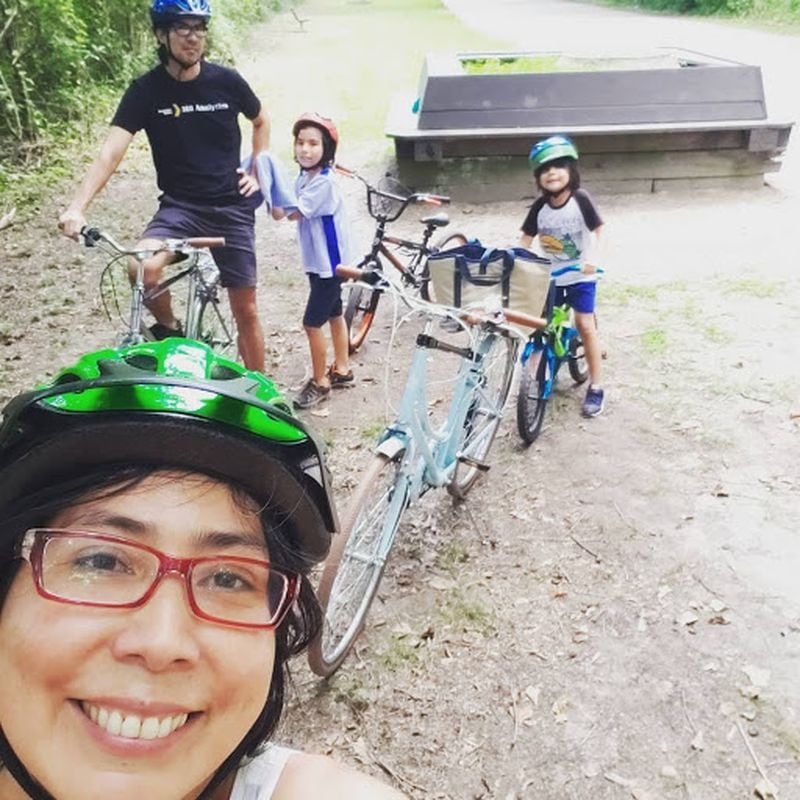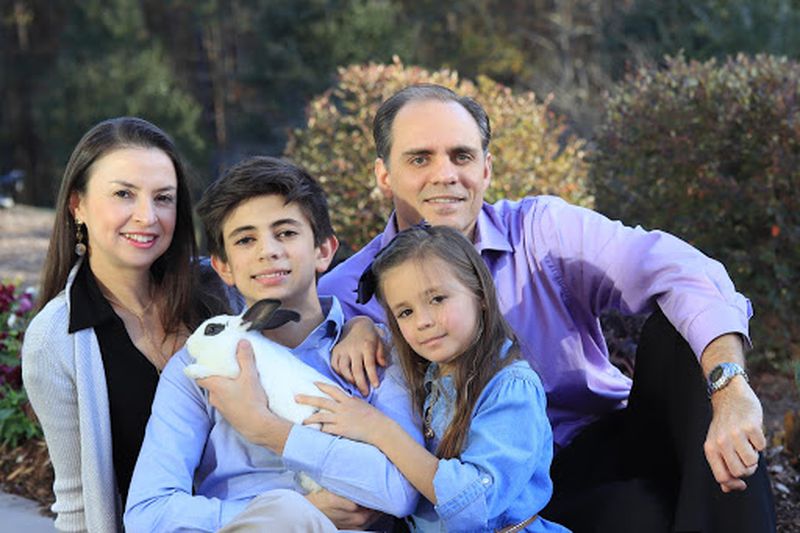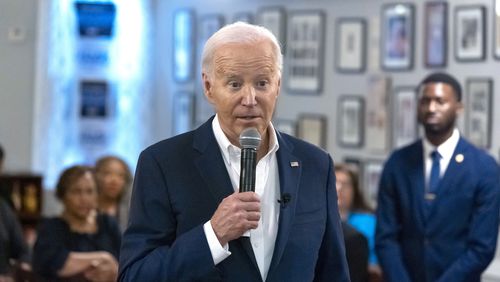For the graduate students and researchers coming to the United States from other countries, the opportunity to study at Georgia Tech is invaluable, but for the spouses who come along with them, it can be a lonely struggle. Many are in the U.S. without family, may face language barriers and because of visa restrictions, may not be able to work. Freelance reporter Liuyu Ivy Chen, who came to Atlanta as an international spouse, shares the stories of some of these spouses and the Georgia Tech organization that helps them.
‘I was getting to know a new husband in a new country’
When Saman Bahram arrived in Atlanta to join her husband in 2016, he was still a stranger to her. She had never met him until two days before their wedding in Pakistan a year prior, an arranged marriage that she accepted with two conditions. First, she would continue pursuing her medical career — she was a practicing physician. Second, she did not want her husband to change her in any way. One week after the wedding, her husband left Pakistan to pursue graduate school in the United States. One year later, when he was enrolled in a Ph.D. program at Georgia Tech, she reunited with him.
“I felt like I was getting to know a new husband in a new country. It was a little lonely in the beginning,” Saman told me during our video conversation in early November. She was quarantined in a hotel room in D.C., recovering from COVID.
“Luckily, my husband received an email about the International Spouses’ Group. I went and instantly found family there,” Saman said.
Credit: Wajeeha Bhatti/Contributed
Credit: Wajeeha Bhatti/Contributed
The Georgia Tech International Spouses’ Group is “a space for spouses, partners, and families of international Georgia Tech graduate students who are looking for a community in Atlanta,” states its website. Karen Yiu, program director for Student Diversity Programs, was an intern at the Women’s Resource Center in summer 2014 when she took on the responsibility to grow this unique community, consisting of mostly international women who were ineligible to work in the United States due to visa constraints.
The group grew quickly, from a handful of members in 2014 to well over 100 today. Despite some less welcoming U.S. immigration polices, the international student population at Georgia Tech has continued to grow, from 5,493 in 2014 to 7,802 in 2018 (among them, 6,277 were graduate students), according to College Factual’s analysis of student visa data in 2019.
Today, however, the Georgia Tech international students are facing financial hardship and visa uncertainty during the prolonged pandemic, and the International Spouses’ Group is on the verge of disintegration due to a lack of formal recognition, funding and staff, as well as the pandemic.
“I don’t know what it’s like to be uprooted, move to the U.S., live on one person’s graduate student salary, not be able to work, have language problems, struggle to get around, and suffer from homesickness. But I can connect them to each other,” Yiu told me during a virtual interview in October. “I think the best resources for those spouses are each other.”
When Saman went to the group orientation in fall 2016, she met a room full of international ladies speaking English with a jamboree of accents, including myself.
I’d gone to the meetings only a few times after I moved from New York to Atlanta in 2016 for my husband’s Ph.D. Unlike many other spouses, I’d just received my green card through marriage which allowed me to work. In the following two years, I experienced excruciating pain looking for a job in the American South with my Chinese background and a poetry degree in order to shed my “spouse” identity.
It was only recently, when I reported on this piece — perhaps to find out what I have been trying to avoid — that I gained a new understanding of and respect for these international spouses.
“The spouses’ group has been a blessing for me. My husband was always busy working. I was going insane staying at home, staring at the walls and not being able to work because of my F-2 visa,” Saman told me. F-2 visa allows dependent spouses and children of student visa holders to enter the United States, but doesn’t grant a work permit. “The spouses’ group was the only thing that kept me going in the beginning.”
From this group, Saman found not only close friends but also study mates to prepare for the United States Medical Licensing Examination. She recently traveled to D.C. to take the third and last test. On the day we talked, she’d just received the good results.
“Now I can finally apply for a residency program!” Saman glowed. Although she’d temporarily lost smell and taste due to a bout of COVID, she radiated energy, as if simultaneously regaining two kinds of health.
“It was a five-year journey for me.” Saman smiled.
‘Often, we are overlooked, sometimes even criticized’
“Traditionally, spouses are seen as following our husbands without an identity of our own. People don’t see that each of us come from a strong background on our own accord,” Elly-Elham Konjkav told me during our video chat in October. “We are lawyers, doctors, engineers, architects, bankers and journalists. But often, we are overlooked, sometimes even criticized.”
She remembered a friend once told her, “I would never move somewhere for my husband if I couldn’t work.”
Elly paused to defend herself, “You never know under what circumstances a couple makes a decision until you talk to them and hear their story.”
Tineke Van Varenberg, originally from Belgium, is eligible to work with conditions. After she moved to Atlanta with her husband in 2016, she found a teaching job at a Dutch school in Roswell. Even so, she told me that her “spouse” identity has often been challenged.
“Many people ask me, ‘Isn’t it hard that you have to go from job to job for your husband’s career?’ For me, it’s not really hard. It’s a decision made by the two of us. I don’t feel like I’m just following my husband. It’s a mistake in perspective. It’s a brave decision we made together to move to a new country to better ourselves.”
Credit: Contributed
Credit: Contributed
Elly was born in Iran, grew up in Singapore, studied law in London, moved back to Singapore, and came to Atlanta with her husband in 2015. As a third culture kid, it was precisely the melting-pot reputation of America that attracted her.
“I’m not from anywhere, but I’m also from everywhere and it is very nice to know that the American people will accept you as one of them. Because you can be American and still be from anywhere in the world,” Elly said during a blog interview with Tineke.
“Atlanta was a pleasant surprise to me. You get to experience both the big city and the big nature,” Elly told me. “I majored in law and I’m very passionate about civil rights and human rights. Atlanta is home to MLK and that is a huge thing for me.”
However, after a honeymoon phase of about six months, it started to hit Elly that she couldn’t work under an H-4 visa, issued to spouses of H-1B high skilled workers. It was not until six months later that she learned about the spouses’ group.
“The spouses’ group has been a huge support for me. It’s a support that I feel if not for it, I would probably be very, very miserable. As an active person, I need a channel to release my energy,” Elly said.
Credit: Maryam Sonboli/Contributed
Credit: Maryam Sonboli/Contributed
Elly and Tineke have been perhaps the most active members of the spouses’ group in the past few years. They volunteered to organize events, brainstormed meeting ideas, shopped for party materials, and started a WhatsApp group to facilitate member communication.
If she was not allowed to work legally, at least she could gain professional skills in this way, Elly had thought. However, because neither she and Tineke nor the spouses’ group is an official part of the university, they could not add the work experience to their resumes.
Last year, Elly and Tineke, with the help of Diversity and Inclusion fellows Diana Roldan and Nadia Szeinbaum, navigated the university bureaucracy to establish the spouses’ group as a formal organization at Georgia Tech — a failed attempt.
“The organization was set up, but when we went online, we found out that only a person with a Georgia Tech email could access the form, so we were essentially barred from it,” Elly told me. In addition, establishing an official organization required 10 student members; spouses could only be counted as “honorary members.”
“It would be really great if Georgia Tech could recognize the international spouses’ group as an official entity of the campus, instead of seeing them as a temporary status, and provide internal support and resources,” said Karen Yiu, the Tech staff member who started the spouses’ group. After four years of volunteering, she has gradually transitioned her role back to a full-time position — organizing the spouses’ group was not an official part of her job description.
“Karen has tried everything to fight for us. We didn’t even know where to start without her. If she leaves, I don’t know who’s going to take over. Which is why we think it’s important to make the group official, so that one of us has professional incentive to do the job, or so someone from the university staff can be appointed as our contact,” Elly told me.
Kim Rosero, who has taught the Spouse Courses at Georgia Tech’s Language Institute since 2012, said in an email, “The international spouses are eager to integrate into the GT community and society at large, and we need to give them a clear path to do that.”
With Yiu’s part-time leadership, the Georgia Tech International Spouses’ Group has already pulled ahead of other institutions in supporting international affiliates.
“The spouses’ group actually helped us decide to come to Georgia Tech rather than Columbia University in New York,” said Magdalena (Maida) Contreras from Chile. “My husband wanted to make sure there would be a support system ready for me after the move.”
Maida’s husband and mine are both in the robotics program. I visited Maida on a sunny Friday afternoon in October. She was playing with her two young sons in the central playground of Tenth and Home, a red-brick housing complex for graduate students with families. Due to COVID, the spouses’ group has stopped in-person meetings since the beginning of 2020.
“A kid’s attention span is 10 minutes. How many 10-minute games can you come up with in a day to keep two kids occupied?” She talked fast while keeping an eye on her sons, one on the swing, the other shoveling sand.
Credit: Contributed
Credit: Contributed
At the moment, Maida was deciding how to spend Christmas with her husband and children. She was uncertain if they could go back to Chile to visit their families because of COVID.
“My younger son is 9 months old and he has never met my family in Chile. That makes me very sad.” (The family was able to make the holiday trip.)
Even though she wasn’t a student or staff, Elly proactively engaged in campus life. She not only volunteered in the spouses’ group, but also made herself useful in the physics building, where her husband works and where she eventually found employment.
“My husband’s boss, Professor Flavio Fenton, also my boss now, is one of the kindest people I’ve met. Because he’s from Mexico, he understands international students’ struggles.”
Elly told me that when the travel ban on visitors from majority-Muslim countries happened, Professor Pablo Laguna, the Physics chair at the time, informed other professors to look out for the international researchers. Elly and her husband, who holds an Iranian passport, received multiple invitations to spend Christmas Eve at local professors’ homes.
“Georgia Tech lawyers did everything they could to make sure that things went smoothly for us,” Elly said. “There’s definitely a heavier weight put on us. Foreigners always have the burden of proving themselves worthy, but Iranians have an extra disadvantage.”
It was only last August that Elly received her permanent resident status. Now that she is eligible to work, her understanding of work has changed.
“Because I couldn’t work for a long time, I decided to go back inside and see what makes me me. Before, I always thought that my identity was what I did, my job. In the U.S., the first question everyone asks is always, ‘So, what do you do?’”
Elly is now back to school to study computer science.
‘It’s very important to keep the spouses’ group operating’
When Andres Wong Blacio went to his first spouses’ group meeting in fall 2016, he felt a little awkward.
“I just came back from the gym and was wearing my gym outfit. I thought I’d meet some other guys, but it was just ladies.” He laughed when I met him virtually in November.
Despite initial intimidation, Andres continued attending the weekly meetings for months. He did not meet another man in the group.
Before they moved to Atlanta, Andres was a software developer, data administrator, and project manager in Ecuador. His wife was a professor at a local university. He’d always wanted to work abroad, so when the university-sponsored opportunity arose for his wife to pursue a doctorate in human-centered computing at Georgia Tech, it was an easy decision. The couple brought their two small sons and boarded the international plane.
“We agreed that it would be beneficial for all of us,” Andres said.
“I love the climate in Atlanta. Four seasons, full of green spaces: trees, parks, hiking places. Nice people. Back in my home city Guayaquil, everything was concrete, hot and humid all year-round.”
Credit: Contributed
Credit: Contributed
Six months after he arrived, when his children started school, Andres found a job as a computer teacher for the Latin American Association in Atlanta (he is eligible to work under a J-2 visa as a spouse of a J-1 visa holder in a work-and study-based exchange visitor program). Andres also studied and applied for an online master’s program in analytics at Georgia Tech. He is scheduled to complete his degree this spring, around the same time his wife will graduate. Then, they plan to return to Ecuador.
“Does your wife feel supported by you?” I asked.
“Actually, we both feel like we have supported each other. Because without her, I wouldn’t have applied for my master’s program; if not for me, she wouldn’t have pursued her Ph.D. It’s been a collaboration for us,” Andres said. “If it’s been a sacrifice, it’s been a mutual sacrifice for our higher goal.”
To encourage more men to join the spouses’ group, Andres advised the group to add more sports sessions and provide more educational and career-oriented resources. “It’s very important to keep the spouses’ group operating. A lot of people will benefit from it,” Andres said. “I certainly have.”
Recalling the most difficult time since he moved here, Andres said: “Definitely in the beginning. There were a lot of things to adapt to. Going to restaurants or grocery stores was always a struggle without a car. We were also looking for schools for our kids.”
“Since we didn’t have a car, I bought a bicycle and added this little carriage on the back to carry my kids. The streets on campus are hilly, and that was not easy.” He laughed.
‘I know how hard it is to be an international spouse’
Patrick Opdenbosch met Claudia Yepes for the first time when they spent the end-of-year vacation in Santa Marta, Colombia. He was 12 and she 14 — she was much taller than him. When the elevator door opened, he stepped out, she walked in, the door closing between them. He’d caught a glimpse of her and watched the elevator light glow and stop — she lived two floors directly below him. Through the help of their housekeepers, he delivered a letter to her. She wrote back.
Next, he sent her a cassette tape which said, “I want you to be my girlfriend, wife, and the mother of my children in the future.”
Thirty years later, I met the couple on a sunny autumnal afternoon. Pink sage grows by the front door of their single-family home in Newnan, Georgia. They are married with two children, a teenage boy and a young girl; two pet bunnies chewing parsley in their cardboard castle fenced in the living room. Claudia works as a real estate agent, Patrick an engineer.
He has grown much taller than her, with graying hair and a deep voice. She has big eyes and lustrously brown hair, serving me fragrant Colombian coffee from her hometown, Bucaramanga.
“Look, here is Bucaramanga,” Patrick zoomed in a map on the phone. “If you draw a straight line up to the Caribbean coast, a little to the left, that’s Santa Marta.” He showed me the relation of her hometown to his as if pointing out the location of his heart.
Credit: Contributed
Credit: Contributed
Patrick came to study at Georgia Tech in 1997. When Claudia joined him a few years later, there was no spouses’ group. She struggled with loneliness and a spiritual void. At a low point, she told Patrick, “I’m going home.” But she thought it over, deciding she would not return without having achieved what she had left to do.
With the help of a university counselor, Claudia slowly found her way. She learned English at a nearby church and earned a degree in psychology at a local college. When Patrick graduated and found a job in Peoria, Illinois, they moved north.
“In Colombia, it’s very common for neighbors to visit and chat with each other. In America, people are more private, and it was not easy to get to know our neighbors,” Claudia told me. Having said goodbye to a few friends in Atlanta, she now tried to make new ones in Peoria.
Winter came; the Colombian family struggled. When the colder climate began to compromise their health five years later, Patrick applied for a work transfer back to Georgia. Claudia left her new friends and settled down with her family in Newnan, the “city of homes.”
“I know how hard it is to be an international spouse, so I want to reach out and help you,” Claudia told me.
Credit: Contributed
Credit: Contributed
Before she became a real estate agent, Claudia was a counselor helping displaced children — mainly African American — growing up in a foster care facility near Newnan. Overwhelmed by the extreme difficulties these children faced, and feeling unable to improve their condition within the system, she left. Next, she found a job assisting troubled Latino teens in an after-school program in north Atlanta. This time, she not only saw the same structural problem, but became psychologically distressed herself.
“I had to leave. It was not good for me mentally.”
Claudia took the real estate license exam and began helping families purchase homes. “Making everyone happy!” She laughed.
“It’s time for her to shine and to be recognized after so many years of sacrifice and contributions to our family and the community. It’s certainly not easy for an international spouse to embark on this journey due to the rules, regulations and misunderstandings they are subject to,” Patrick told me.
“Even when she sells houses, she continues to help new immigrants and low-income families.” Patrick said.
Claudia talks to Latino families in Spanish, telling them how to improve their credit scores and negotiate bank loans.
“I recently helped a large family of Venezuelan refugees buy a house in Newnan,” she said gently but proudly.
“Do you feel like you’re home now?” I asked her.
“Yes?” She thought hard. “And no.”
“But now my husband works here, and my children are going to school here, I guess it is my home.” She smiled. “How about you?”
“I don’t know. We’ll move again next year.”
“I understand.”
About the Author
Credit: AP
